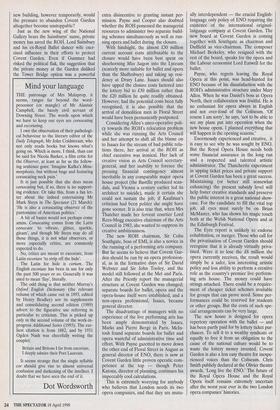Mind your language
THE patronage of Mrs Malaprop, it seems, ranges far beyond the word- processor (or mangle) of Mr Alastair Campbell, the barely civil servant of Downing Street. The words upon which we have to keep our eyes are coruscating and excoriating.
I owe the observation of their pathologi- cal behaviour to the literary editor of the Daily Telegraph, Mr John Coldstream, who not only reads books but knows what's going on. Which is more, I think, than can be said for Nicola Barker, a film critic for the Observer, at least as far as the follow- ing sentence goes: 'Imagine Kafka's Meta- morphosis, but without bugs and featuring coruscating neck pain.'
It is just possible that she does mean coruscating but, if so, there is no support- ing evidence, Or take this, from a fan let- ter about the indeed entertaining Mr Mark Steyn in The Spectator (21 March): `He is also a coruscating observer of the pantomime of American politics.'
A bit of basics would not perhaps come amiss. Coruscating comes from the Latin coruscare 'to vibrate, glitter, sparkle, gleam', and though Mr Steyn may do all those things, it is not what observers, or more especially critics, are commonly expected to do.
No, critics are meant to excoriate, from Latin excoriate 'to strip off the hide'.
The Latin for hide is corium. The English excoriate has been in use for only the past 500 years or so. Generally it was used to mean 'flay', literally.
The odd thing is that neither Murray's Oxford English Dictionary (the relevant volume of which came out in 1893, edited by Henry Bradley) nor its supplements and consolidating second edition (1989) advert to the figurative use referring in particular to criticism. This is picked up only in the second volume of the work-in- progress Additional Series (1993). The ear- liest citation is from 1882, and by 1931 Ogden Nash was cheerfully writing the couplet:
Britain and Britons I far from excoriate, I deeply admire their Poet Laureate.
It seems strange that the single syllable cor should give rise to almost universal confusion and darkening of the intellect. I doubt that we have seen the end of it.
Dot Wordsworth


























































 Previous page
Previous page